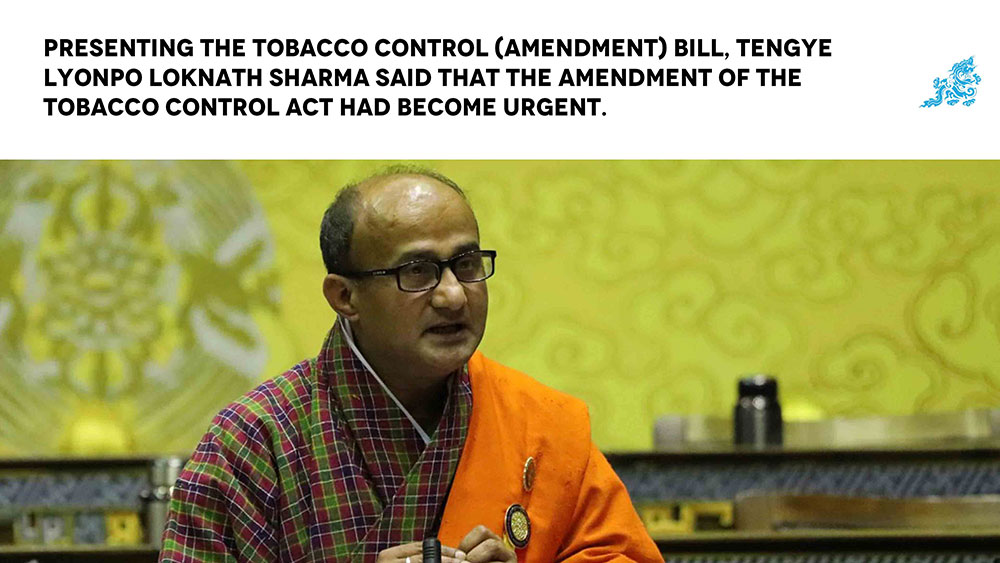… proposes to reduce sales tax on tobacco to zero percent as an interim measure
MB Subba
The government will not levy sales tax on tobacco and tobacco products until the implementation of the Goods and Services Tax (GST) in July next year if Parliament passes the Tax Bill 2021.
The GST Bill was introduced yesterday in the National Assembly along with the Tobacco Control (Amendment) Bill 2021, which seeks to repeal the legal provisions that restrict the import and sale of tobacco in the country. All tobacco products imported from India and sold through outlets are levied 100 percent sales tax.
Presenting the Bill, Finance Minister Namgay Tshering said that the measure was necessary to eliminate the risk of importation of the “highly contagious” virus and to curb the black market and that it had become urgent to do away with the tax totally. The tax, he said, would be taken care of once the GST Act is implemented.
He said that while access to tobacco products was eased, the high tax rate had retained opportunities for individuals to continue to indulge in illegal border crossing to smuggle tobacco products due to high-profit margins. “The greater concern is the risk of importation and transmission of Covid-19 from illegal smuggling of tobacco products and exchange of cash.”
With the emergence of the highly contagious Delta variant, Lyonpo Namgay Tshering said that the risk of cross border transmission and threats to public health and human life from this new variant was “grave and imminent”. “The proposed sales tax revision will undoubtedly draw criticism from various people and institutions that are genuinely concerned about the ill effects of tobacco,” he said, appealing to people to show solidarity.
Presenting the Tobacco Control (Amendment) Bill, Tengye Lyonpo (Economic Affairs Minister) Loknath Sharma said that tobacco smuggling cases had increased with the imposition of restrictions at the points of entry at the southern border and that the amendment of the Tobacco Control Act had become urgent.
Citing records with the Office of Attorney General (OAG), lyonpo said that the number of tobacco-related cases had increased from 16 in 2019 to 42 in 2020 and 14 in the first six months of 2021. According to him, the number of tobacco products seized since 2019 had tripled.
About 307 cases of tobacco smuggling, he said, were recorded between 2020 and 2021. “These are the cases that were caught, but there would be many more that were not caught,” he said.
Lyonpo Loknath Sharma said that the smuggling caused security risks in the country. Citing an example, he said that a police constable, Suk Raj Subba, was injured in March this year as he stopped miscreants from entering the country at the border in Phuentsholing.
He also said that the southern Covid-19 task force had pointed out that smuggling of tobacco was the main reason for the spread of Covid-19 in the southern dzongkhags.
“If the Act is amended, tobacco will be easily available at lower prices and the smuggling cases will fall,” Tengye Lyonpo said, adding that the Duty Free Limited had not been able to adequately serve all consumers.
However, Opposition Leader Dorji Wangdi supported the move saying that the smuggling of tobacco had not only increased the Covid-19 risks but also posed security threats.
However, he added that the ban should be lifted temporarily until the pandemic subsides and that the issue could be solved through an executive decision without amending the Act. “The government has been already distributing tobacco products in violation of the Act,” he reasoned, adding that allowing Duty-Free to sell tobacco had not reduced prices in the market.
Maenbi-Tsaenkhar MP Choki Gyeltshen also said that he supported the tobacco Bill only as a temporary measure and that the ban should be re-imposed when the Covid situation improves. “If tobacco products are made available chocolates, then it will have negative implications in the society,” he said.
Gangzur-Minjey MP Kinga Penjor said that it was not possible to make people quit smoking through the implementation of a law. He said that the country should resort to awareness and religious programmes to address such issues.
Samtse’s Phuentshopelri MP Ganesh Ghimiray said that the lifting of the ban would not only reduce the prices of tobacco products but also enhance their availability.
The Prime Minister’s Office (PMO) issued a press release yesterday, stating that despite the relentless efforts to guard the border, the illegal imports of tobacco and related products had been rampant.
Records with Royal Bhutan Police (RBP) show a total confiscation of over Nu 7 million worth of tobacco products as opposed to Nu 2.9 million (M) in 2019. In 2021, as of June, the RBP has already seized Nu 5.9M worth of tobacco products (value calculated on MRP, without 100 percent tax).
It stated that the law existed amid a thriving black market, defeating the very purpose of the ban and that there were enough indications that tobacco users have increased, particularly among youth despite the ban.
“This is not about undoing a law that has worked well for the nation. We understand the overpowering social and religious sentiments, and we will be mindful of that. But this is an opportunity to bring about an Act that truly fulfils its noble objective of discouraging tobacco use and protecting the health of our people,” the PMO stated.
It stated that the proposal was not new. “We are returning to embrace the wisdom the National Council propagated in 2014.”
The PMO added that the provisions like restrictions on smoking in public places, institutions and offices, public transports and entertainment centres will stand as per the existing law. “Our intention is to come up with more stringent regulations within the country.”
The Tobacco Control (Amendment) Bill has been tabled as an urgent Bill, which should be passed within this session. The Tax Bill should also be passed in the same session as it is a money Bill.
Edited by Tshering Palden


